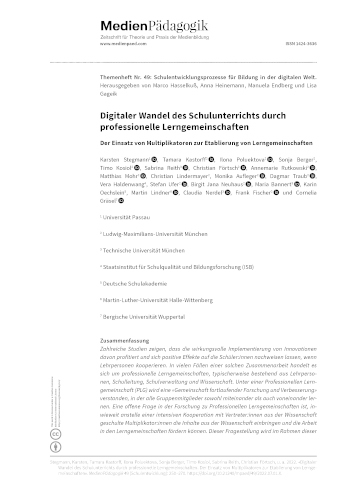Abstract
Numerous studies provide evidence that successful implementation of innovation as well as learning of students benefit from teacher collaboration. Such collaboration often takes place as part of so-called Professional Learning Communities (PLC). PLCs are communities of learners that continuously do research with the goal of further improvement at three levels: individual, community, and institution. All members of PLC learn from and with each other through collaborative work to reach a joint goal. An open issue in research on PLC is, however, to what extent an intensive collaboration with Science can be compensated by facilitation through specifically trained multiplicators. To what extent can multiplicators place the scientific content and facilitate the collaboration within a PLC? To answer these research questions, PLCs on digitalization of teaching STEM in school were founded in 2020/2021 at three Bavarian secondary schools (two Mittelschulen, one Realschule). The results of the conducted interview study suggest, that multiplicators can successfully establish PLCs. However, not all functions of scientific PLC members can be equally compensated. To fulfill the needs of the PLC, additional multiplicators with focus on STEM didactics (e. g., heads of STEM subjects from the schools themselves) may be trained to support the subject-related work on material for teaching with digital media.
References
Biehler, Rolf, Thomas Lange, Timo Leuders, Bettina Rösken-Winter, Petra Scherer, und Christoph Selter. 2018. Mathematikfortbildungen professionalisieren. Springer Spektrum. https://doi.org/10.1007/978-3-658-19028-6.
Bonsen, Martin, und Hans-Günter Rolff. 2006. «Professionelle Lerngemeinschaften von Lehrerinnen und Lehrern». Zeitschrift für Pädagogik 52 (2): 167–84. https://doi.org/10.25656/01:4451.
Buhren, Claus G., und Hans-Günter Rolff. 2012. Handbuch Schulentwicklung und Schulentwicklungsberatung. Weinheim: Beltz.
Coburn, Cynthia E, und William R Penuel. 2016. «Research-practice partnerships in education: Outcomes, dynamics, and open questions». Educational researcher 45 (1): 48–54. https://doi.org/10.3102/0013189X16631750.
Dresing, Thorsten, und Thorsten Pehl. 2018. Praxisbuch Interview, Transkription & Analyse Anleitungen und Regelsysteme für qualitativ Forschende. Marburg: dresing & pehl.
Drossel, Kerstin, Birgit Eickelmann, and Julia Gerick. 2017. Predictors of teachers’ use of ICT in school – the relevance of school characteristics, teachers’ attitudes and teacher collaboration. Education and Information Technologies 22 (2): 551–73. https://doi.org/10.1007/s10639-016-9476-y.
Fussangel, Kathrin. 2008. Subjektive Theorien von Lehrkräften zur Kooperation. Diss. Universität Wuppertal, Fakultät für Human- und Sozialwissenschaften.
Gerick, Julia. 2018. «School level characteristics and students’ CIL in Europe–A latent class analysis approach». Computers & Education 120: 160-171. https://doi.org/10.1016/j.compedu.2018.01.013.
Gräsel, Cornelia, und Kathrin Fussangel. 2010. «Die Rolle von Netzwerken bei der Verbreitung von Innovationen». In Schulreform durch Vernetzung. Interdisziplinäre Betrachtungen, herausgegeben von Nils Berkemeyer, Wilfried Bos und Harm Kuper, 117–31. Münster: Waxmann.
Gräsel, Cornelia, Kathrin Fussangel, und Ilka Parchmann. 2006. «Lerngemeinschaften in der Lehrerfortbildung». Zeitschrift für Erziehungswissenschaft 9 (4): 545–61. https://doi.org/10.1007/s11618-006-0167-0.
Gräsel, Cornelia, Kathrin Fußangel, und Christian Pröbstel. 2006. Lehrkräfte zur Kooperation anregen – eine Aufgabe für Sisyphos? Zeitschrift für Pädagogik 52 (2): 205–19.
Kansteiner, Katja, Christoph Stamann, und Maria Rist. 2020. «Merkmale Professioneller Lerngemeinschaften – Analyse ihrer konzeptuellen Herkunft und Möglichkeiten ihrer Systematisierung». In Professionelle Lerngemeinschaften als Entwicklungsinstrument im Bildungswesen, herausgegeben von Katja Kansteiner, Christoph Stamann, Claus G. Buhren und Peter Theurl, 16–36. Weinheim: Beltz.
Lomos, Catalina, Roelande H. Hofman, und Roel J. Bosker. 2011. «Professional communities and student achievement – a meta-analysis». School Effectiveness and School Improvement 22 (2): 121–48. https://doi.org/10.1080/09243453.2010.550467.
Louis, Karen S, Sharon D Kruse, und Helen M Marks. 1996. «Schoolwide professional communities». In Authentic achievement: Restructuring schools for intellectual quality, herausgegeben von Fred M. Newmann, 170–203. San Francisco: Jossey-Bass.
Mayring, Philipp, und Thomas Fenzl. 2019. «Qualitative Inhaltsanalyse». In Handbuch Methoden der empirischen Sozialforschung, herausgegeben von Nina Baur und Jörg Blasius, 633–48. Wiesbaden: Springer VS. https://doi.org/10.1007/978-3-658-21308-4_42.
Newmann, Fred M. 1994. «School-Wide Professional Community». Issues in restructuring schools 6: 1–3. https://eric.ed.gov/?id=ED370214.
Richter, Dirk, und Hans Anand Pant. 2016. Lehrerkooperation in Deutschland. Eine Studie zu kooperativen Arbeitsbeziehungen bei Lehrkräften der Sekundarstufe I. Gütersloh: Bertelsmann Stiftung.
Rolff, Hans-Günter. 2016. Schulentwicklung kompakt. Modelle, Instrumente, Perspektiven. 3. Auflage. Weinheim: Beltz.
Rolff, Hans-Günter. 2014. «Professionelle Lerngemeinschaften als Königsweg». In Handbuch Unterrichtsentwicklung, herausgegeben von Hans-Günter Rolff, 564–75. Weinheim: Beltz.
Schröder-Lausen, E., und C. Nerdel. 2008. «Kooperation von Grundschullehrkräften zum Heimat- und Sachunterricht. Erste Ergebnisse einer Fragebogenstudie». Zeitschrift für Didaktik der Naturwissenschaften 14: 185–200. https://archiv.ipn.uni-kiel.de/zfdn/pdf/14_010_SchroederLau_Nerdel.pdf.
Wilke, Carina. 2019. Professionelle Lerngemeinschaften und die Verbesserung des Unterrichts in der Schule. Zur Rolle der Kommunikation zwischen Lehrkräften. München: GRIN.

